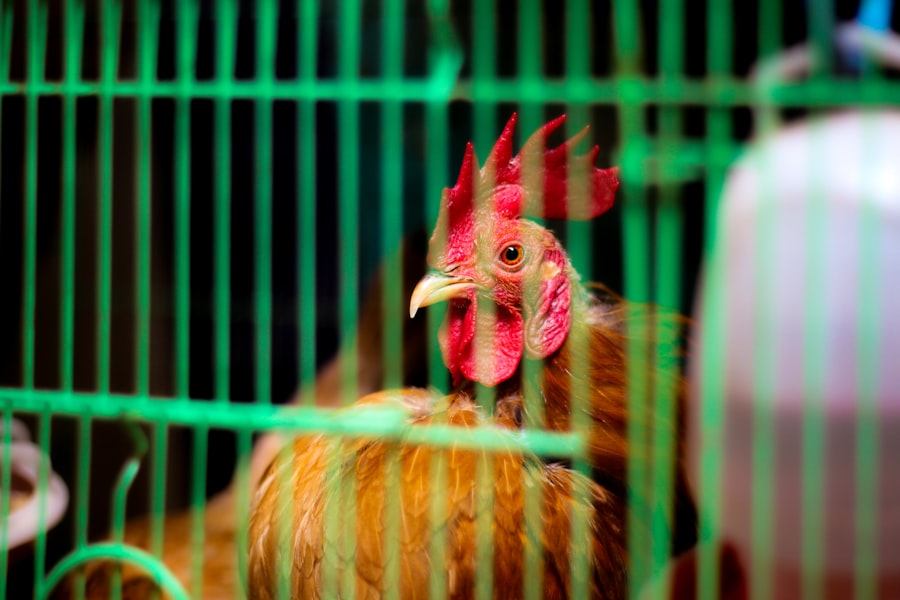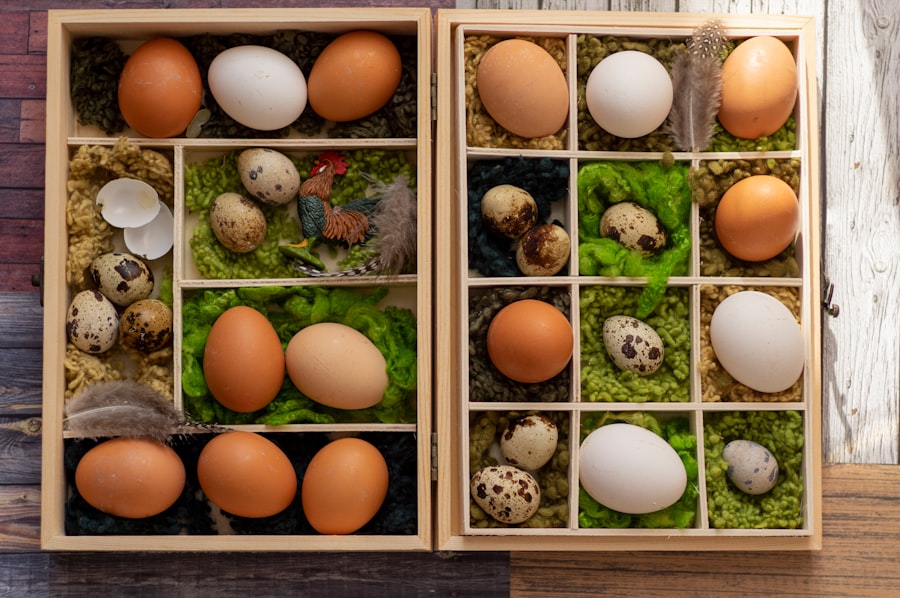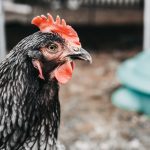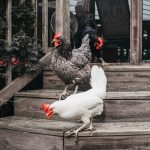Keeping chickens requires adherence to specific guidelines and regulations to ensure the birds’ health and welfare. In the United Kingdom, the Department for Environment, Food & Rural Affairs (DEFRA) provides comprehensive guidelines for chicken keepers. These guidelines cover various aspects of chicken care, including:
1.
Housing and space requirements
2. Health and welfare standards
3. Biosecurity measures
4.
Feeding and nutrition guidelines
5. Legal requirements
DEFRA’s guidelines are designed to assist chicken keepers in providing optimal care for their birds and to prevent the spread of diseases. By following these recommendations, individuals can ensure they are meeting the necessary standards for responsible chicken keeping.
Adhering to these guidelines not only promotes the well-being of the chickens but also helps maintain public health and safety standards in the broader context of poultry management.
Table of Contents
- 1 Housing and space requirements for chickens
- 2 Health and welfare guidelines for chickens
- 3 Biosecurity measures to prevent disease in chickens
- 4 Feeding and nutrition guidelines for chickens
- 5 Legal requirements for keeping chickens
- 6 Resources and support for chicken keepers
- 7 FAQs
- 7.1 What are the DEFRA guidelines for keeping chickens?
- 7.2 What are the housing requirements for chickens according to DEFRA guidelines?
- 7.3 What biosecurity measures are recommended by DEFRA for keeping chickens?
- 7.4 How does DEFRA advise on preventing disease in chickens?
- 7.5 Are there any specific regulations for keeping chickens in urban areas according to DEFRA guidelines?
Key Takeaways
- DEFRA guidelines provide essential information for keeping chickens in a safe and healthy environment
- Adequate housing and space are necessary for chickens to thrive and prevent overcrowding
- Health and welfare guidelines include regular health checks and access to clean water and food
- Biosecurity measures such as controlling access to the flock and disinfecting equipment help prevent disease
- Feeding and nutrition guidelines emphasize a balanced diet and access to grit and oyster shell for calcium
- Legal requirements for keeping chickens may include registration and compliance with local zoning laws
- Resources and support for chicken keepers can be found through local agricultural extension offices and online forums
Housing and space requirements for chickens
Coop Requirements
When it comes to housing and space requirements for chickens, it is essential to provide a safe and comfortable environment for your birds. Chickens should have access to a secure coop that protects them from predators and the elements, as well as a spacious outdoor area for foraging and exercise. The coop should be well-ventilated and provide at least 1 square foot of space per bird, with additional space for nesting boxes and perches.
Outdoor Space Requirements
Outdoor runs should provide at least 10 square feet per bird to allow for natural behaviors such as scratching and dust bathing. It’s important to regularly clean and maintain the coop and outdoor areas to prevent the spread of disease and ensure the health and welfare of your birds.
In addition to providing adequate housing and space, it’s important to consider the social dynamics of your flock. Chickens are social animals and thrive in groups, so it’s recommended to keep a minimum of three birds to prevent loneliness and stress. It’s also important to consider the breed and size of your chickens when determining housing and space requirements, as larger breeds may require more space than smaller breeds.
By following these housing and space guidelines, you can ensure that your chickens have a safe and comfortable environment to thrive in.
Health and welfare guidelines for chickens

Maintaining the health and welfare of your chickens is essential for their overall well-being and productivity. DEFRA guidelines outline several key considerations for ensuring the health and welfare of your birds, including regular health checks, vaccination programs, and disease prevention measures. It’s important to monitor your chickens for signs of illness or injury and seek veterinary care when necessary.
Additionally, implementing a vaccination program can help protect your birds from common diseases such as Newcastle disease and infectious bronchitis. In addition to regular health checks and vaccination programs, it’s important to provide a balanced diet, clean water, and appropriate environmental enrichment for your chickens. A balanced diet that includes a mix of grains, protein, vitamins, and minerals is essential for maintaining the health and productivity of your birds.
Clean water should be provided at all times to prevent dehydration, and environmental enrichment such as perches, dust bathing areas, and toys can help prevent boredom and stress. By following these health and welfare guidelines, you can ensure that your chickens are happy, healthy, and thriving.
Biosecurity measures to prevent disease in chickens
Biosecurity measures are essential for preventing the spread of disease in chickens and protecting the health of your flock. DEFRA guidelines outline several key biosecurity measures that can help minimize the risk of disease transmission, including controlling access to your property, practicing good hygiene, and monitoring the health of your birds. Controlling access to your property can help prevent the introduction of disease-carrying pests or pathogens, while practicing good hygiene such as regularly cleaning and disinfecting equipment can help prevent the spread of disease within your flock.
Monitoring the health of your birds is also an important biosecurity measure, as it can help you identify and address potential health issues before they become a larger problem. Additionally, it’s important to quarantine new birds before introducing them to your existing flock to prevent the spread of disease. By implementing these biosecurity measures, you can help protect the health of your chickens and minimize the risk of disease transmission.
Feeding and nutrition guidelines for chickens
Providing a balanced diet is essential for maintaining the health and productivity of your chickens. DEFRA guidelines emphasize the importance of providing a diet that meets the nutritional needs of your birds, including a mix of grains, protein, vitamins, and minerals. A balanced diet can help support egg production, growth, and overall health in your flock.
It’s important to provide access to clean water at all times, as dehydration can have serious health consequences for chickens. In addition to providing a balanced diet, it’s important to consider the specific nutritional needs of different life stages and breeds of chickens. For example, laying hens may require a higher protein diet to support egg production, while growing chicks may require additional nutrients for growth and development.
By understanding the nutritional needs of your birds and providing a balanced diet, you can ensure that your chickens are healthy and productive.
Legal requirements for keeping chickens

Registration and Movement Restrictions
DEFRA guidelines outline several key legal considerations for chicken keepers, including registration requirements and movement restrictions. Depending on where you live, you may be required to register your flock with local authorities or comply with movement restrictions to prevent the spread of disease.
Disease Reporting Obligations
It’s crucial to be aware of disease reporting obligations in the event that you suspect a notifiable disease in your flock. Notifiable diseases are those that are considered a serious threat to animal or public health, such as avian influenza or salmonella. If you suspect a notifiable disease in your flock, it’s important to report it to local authorities immediately to prevent the spread of disease.
Compliance with Legal Requirements
By understanding and complying with these legal requirements, you can ensure that you are meeting the necessary regulations for keeping chickens in your area.
Resources and support for chicken keepers
For those new to chicken keeping or looking for additional support, there are a variety of resources available to help you provide the best possible care for your birds. DEFRA provides comprehensive guidance on their website covering all aspects of chicken keeping, including housing, health, welfare, biosecurity, feeding, nutrition, and legal requirements. Additionally, local agricultural extension offices or poultry clubs may offer workshops or training opportunities for chicken keepers.
Online forums and social media groups can also be valuable resources for connecting with other chicken keepers and sharing knowledge and experiences. These communities can provide support, advice, and guidance on all aspects of chicken keeping. By taking advantage of these resources and support networks, you can continue to learn and grow as a chicken keeper while providing the best possible care for your flock.
In conclusion, DEFRA guidelines provide comprehensive guidance on all aspects of chicken keeping, from housing and space requirements to health and welfare guidelines, biosecurity measures, feeding and nutrition guidelines, legal requirements, and resources for support. By following these guidelines, you can ensure that you are providing the best possible care for your chickens while minimizing the risk of disease transmission. Whether you are new to chicken keeping or an experienced keeper looking for additional support, there are resources available to help you provide the best possible care for your flock.
If you’re interested in keeping chickens, you may also want to learn about the incubation period for goose eggs. Poultry Wizard has a helpful article on what is the incubation period for goose eggs that provides valuable information for anyone looking to expand their poultry knowledge.
FAQs
What are the DEFRA guidelines for keeping chickens?
The DEFRA guidelines for keeping chickens include regulations on housing, biosecurity, and disease prevention to ensure the health and welfare of the birds.
What are the housing requirements for chickens according to DEFRA guidelines?
DEFRA guidelines require that chicken housing provides adequate space, ventilation, and protection from predators. It should also be kept clean and well-maintained.
What biosecurity measures are recommended by DEFRA for keeping chickens?
DEFRA recommends implementing biosecurity measures such as controlling access to the chicken area, cleaning and disinfecting equipment, and preventing contact with wild birds to reduce the risk of disease transmission.
How does DEFRA advise on preventing disease in chickens?
DEFRA advises keeping chickens vaccinated, monitoring their health regularly, and seeking veterinary advice if any signs of illness are observed. It also recommends practicing good hygiene and sanitation to prevent the spread of diseases.
Are there any specific regulations for keeping chickens in urban areas according to DEFRA guidelines?
DEFRA guidelines do not have specific regulations for keeping chickens in urban areas, but local authorities may have their own regulations regarding the keeping of poultry in residential areas. It is important to check with the local council before keeping chickens in urban areas.
Meet Walter, the feathered-friend fanatic of Florida! Nestled in the sunshine state, Walter struts through life with his feathered companions, clucking his way to happiness. With a coop that’s fancier than a five-star hotel, he’s the Don Juan of the chicken world. When he’s not teaching his hens to do the cha-cha, you’ll find him in a heated debate with his prized rooster, Sir Clucks-a-Lot. Walter’s poultry passion is no yolk; he’s the sunny-side-up guy you never knew you needed in your flock of friends!







